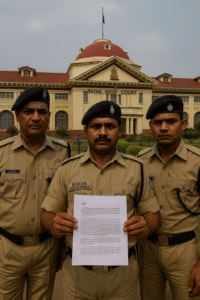The Patna High Court has clarified when service of summons by affixation is legally sufficient and how appellate courts should treat court records while deciding applications to set aside an ex-parte decree. In a petition under Article 227 of the Constitution, the High Court set aside a 2016 order of the first appellate court and restored the trial court’s rejection of an Order IX Rule 13 CPC application that sought to nullify an ex-parte decree passed in 1999 for specific performance of a land sale agreement.
The dispute began with a title suit filed in 1997 seeking specific performance of a 1997 “baibeyana” (agreement to sell) for a small parcel of land. After repeated attempts at service, the defendant did not appear and the suit was decreed ex-parte on 05.08.1999. An execution case followed; summons were again issued; one of the defendant’s sons appeared in the execution proceedings in May 2001, filed an application, and then stopped appearing. The defendant then moved under Order IX Rule 13 to set aside the ex-parte decree. The trial court, on 14.09.2011, dismissed that application, finding the defendant had knowledge of both the title suit and the execution case and had intentionally avoided appearance. However, on 01.09.2016, the first appellate court allowed the appeal and set aside the trial court’s order—prompting the Article 227 challenge.
Before the High Court, the petitioners argued that service of summons had in fact been validly effected during the suit; that the process server’s report and the Nazir’s testimony established service and subsequent delivery of possession in execution; and that the appellate court wrongly shifted the burden onto the decree-holders to disprove non-service in an Order IX Rule 13 proceeding. They also pointed out that in the execution case, the defendant’s son had appeared, and later the sale deed was executed through court on 18.01.2003 and possession delivered on 12.03.2004—facts the appellate court overlooked.
The respondents countered that the service was defective: there was no proper satisfaction that the defendant was avoiding service, no substituted service by publication, no proof of registered post, and the persons said to be present at the time of affixation were not examined. They urged that courts should take a liberal approach when asked to set aside an ex-parte decree.
The High Court focused on Order V Rule 17 CPC, which permits service by affixation when a defendant refuses service or cannot be found despite due diligence. Importantly, the Court emphasized that omission to record the names of identifying witnesses in every case is not fatal; what matters is credible evidence that the serving officer followed the prescribed method. Here, the process server specifically stated that on the defendant’s refusal he affixed the summons on the eastern door of the house in the presence of two witnesses; and official court witnesses (including the Nazir) corroborated service and delivery of possession. The appellate court, the High Court held, should not have lightly discarded this official evidence absent any allegation of mala fides.
Reiterating that judicial records and order-sheets are sacrosanct unless mala fides are shown, the Court relied on a prior Patna High Court decision to hold that the appellate court erred in preferring the respondents’ oral assertions over the court record and official testimony. Consequently, the High Court set aside the 2016 appellate order and allowed the civil miscellaneous petition, thereby restoring the trial court’s dismissal of the Order IX Rule 13 application.
Significance or Implication of the Judgment (For general public or government)
This judgment gives practical guidance to litigants and trial courts on two recurring issues in civil litigation:
- Service by affixation is valid when Rule 17 conditions are met. If a defendant evades service or refuses to accept summons, a serving officer may affix the summons at a conspicuous part of the defendant’s residence. Courts should assess the serving officer’s report and testimony. The absence of the witnesses’ signatures or complete identifying details is not, by itself, enough to invalidate service, provided the serving officer’s account is credible and untainted by mala fides.
- Official court records deserve primacy. Order-sheets and reports by court officials (process server, Nazir) carry presumptive authenticity. Appellate courts should not discard them lightly without strong reasons. This ensures finality, deters dilatory tactics, and preserves confidence in court process.
- Ex-parte decrees are not undone lightly when avoidance is evident. Where the record shows the defendant knew of the proceedings (including through participation by a family member in execution) and still stayed away, courts may refuse to set aside the decree. This promotes certainty and protects decree-holders from endless re-litigation.
For government departments and public authorities frequently engaged in civil suits, the ruling underscores the importance of meticulous process service and preserving service records. For citizens, it is a caution: evading service can backfire, and later pleas of non-service will be scrutinized against the court’s own records and officials’ testimony.
Legal Issue(s) Decided and the Court’s Decision with reasoning
- Whether service of summons in the original suit was valid under Order V Rule 17 CPC.
Decision: Yes. The process server’s testimony established that, upon refusal, the summons was affixed at the defendant’s residence; this satisfied Rule 17. The lack of witnesses’ signatures did not vitiate service. Reasoning: Rule 17 does not mandate that in every case the names and addresses of identifying witnesses must be recorded; credible official evidence suffices. - Whether the first appellate court erred in disbelieving court officials’ evidence and setting aside the trial court’s order.
Decision: Yes; it committed a jurisdictional error. Reasoning: Judicial records and order-sheets are sacrosanct absent mala fides. The appellate court wrongly preferred private testimony over official records and ignored material facts, including participation in execution and delivery of possession. - Whether the Order IX Rule 13 application to set aside the ex-parte decree should have been allowed.
Decision: No; the trial court rightly dismissed it, and its order stands restored. Reasoning: The defendant had knowledge of the suit and execution; evasion of summons was evident; official service was proved; and subsequent execution steps (including sale deed and possession) occurred through court process.
Judgments Relied Upon or Cited by Court
- Pabitri Devi & Ors. v. Rash Bihari Gope & Ors., 2010 (2) PLJR 942 — order-sheets in judicial/quasi-judicial proceedings are sacrosanct; when questioned and the author cannot be examined, the order-sheet prevails.
Case Title
Bechani Devi Vs. Sri Kanshi Rai
Case Number
Civil Miscellaneous Jurisdiction No. 881 of 2017 (Patna High Court)
Citation(s)
2025 (1) PLJR 604
Coram and Names of Judges
Hon’ble Mr. Justice Arun Kumar Jha (CAV Judgment dated 07.01.2025)
Names of Advocates and who they appeared for
- For the petitioners: Mr. Ajay Kumar Singh, Advocate
- For the respondents: Mr. Jitendra Kumar Roy-1, Advocate; Mrs. Usha Kumari Singh, Advocate
Link to Judgment
NDQjODgxIzIwMTcjMSNO-Ijnq9NVdBVM=
If you found this explanation helpful and wish to stay informed about how legal developments may affect your rights in Bihar, you may consider following Samvida Law Associates for more updates.








